Strictly Personal
Where do SA’s best interests lie globally? by Richard Calland
Published
2 years agoon
Ukraine shouldn’t have worn such a short skirt. It invited trouble. It’s Ukraine’s fault that it got raped.
Some of the contextual and historical analysis of why the Russian invasion took place blames Ukraine. It shouldn’t have been so independent, so democratic — or, in some absurd accounts, so “neo-Nazi” — nor should it have aspired to Nato or European Union membership.
It’s a thin line between trying to explain why a war has broken out and what could and should have happened to prevent it, and blaming the victim for military aggression that is causing death and destruction to its people and its cities.
South Africa’s foreign policy, and its position at the United Nations, does not cross this line, despite the gnashing of teeth of certain Western diplomats and politicians. What irks them is a belief that Pretoria is appeasing Vladimir Putin or supports Russia.
This is neither accurate or fair, nor reasonable. To say that it does represents a failure to grasp South Africa’s place in the world and to understand what its diplomatic efforts have been trying to achieve.
But it was fuelled by South Africa’s position at the UN last week when two humanitarian resolutions were debated at the General Assembly. A fair analysis requires an understanding of what transpired and why.
As a first humanitarian resolution was drafted, the “pen-holders” were France and Mexico, whose aim was to achieve wide and diverse support. Most humanitarian resolutions are relatively uncontroversial and are dealt with by the UN Security Council. This one could not because it condemned the military action of one of the five permanent members of the Security Council, which enjoys a veto right. So, it went to the General Assembly. South Africa, with the backing of other countries, wanted the resolution modified to maximise support.
Pretoria neither hoped nor expected to persuade Russia to support the resolution — it couldn’t since its proposed modified resolution also spoke to the need to respect Ukraine’s territorial integrity and sovereignty, as well as to refrain from destroying buildings and infrastructure — in line with Pretoria’s view that Russia is in breach of international law.
The department of international relations and cooperation had spelt this out to the ANC in a briefing days after the start of the invasion, asserting the view that Russia was violating international law by using force without the sanction of the Security Council or without there being a credible and imminent threat of the use of force by Ukraine.
South Africa’s ambassador, Mathu Joyini, was especially busy, encouraged by some EU diplomats to think that there was an opportunity to mould one resolution. Her view was that the best outcome would be a resolution that would attract maximum support and therefore make it harder for Russia to ignore a strong resolution calling for specific action on creating humanitarian corridors.
Pretoria gets that Putin is dangerous; it buys into the idea that Putin would use nuclear weapons if he is pushed into a corner, and recalls his chilling statement shortly after the invasion started that “Why do we need a world if Russia is not in it?” Which is why Pretoria is focusing so much attention on diplomacy that works, rather than grandstanding, and which might succeed in driving Putin towards a peaceful negotiation process rather than more and more dangerous bellicosity.
This may be misjudged, or naive, or may over-reach South Africa’s influence, but it is not ill-intended.
In the event, Ukraine closed the door on further revision of what by then had become its resolution. It wanted wording of condemnation of Russia. It won a clear majority, with 140 in favour, but with 38 abstentions, many of whom might have supported a single resolution that focused on the humanitarian issues rather than on condemning the Russian offensive.
What is harder to understand is why South Africa persisted with its resolution. One answer provided by the department of international relations’ diplomats is that since it had the support of a significant number of countries it was important to table it and have it voted on.
Was this a wise decision, given the blow-back that Pretoria has faced since? Was the harm to its global reputation worth risking?
Probably not, since the argument on the resolution was already lost. It was poor decision-making, perhaps, but not “bending over backwards to serve Russian masters” as some have suggested, and certainly not deserving of any “Mampara” award.
Joyini, along with colleagues such as Ambassador Ndumiso Ntshinga and Zaheer Laher back at HQ, who lead on the UN side, are seasoned diplomats, people of professional integrity.
I wonder how many of those who have passed judgment have looked at the precise wording of the two resolutions, still less troubled to speak to the people at the diplomatic coal-face.
The non-alignment position is consistent with the past two decades of South African foreign policy — with the exception of former president Jacob Zuma’s ex-spook strong-man bromance with Putin. Ramaphosa is still trying to reverse out of the dubious “obligations” that Putin’s embezzlement of Zuma in relation to the unlawful nuclear power procurement process created, and that may have some influence on how Ramaphosa deals with Putin.
But again, I can find no direct link with Pretoria’s UN stance on Ukraine.
It is a question of a difference of worldview, as well as a different set of interests, and it is surprising that so many Western diplomats and commentators cannot recognise this.
It is unreasonable of Western capitals and diplomats, who tend to see Ukraine in binary moral absolutist terms, to expect a country of the Global South, such as South Africa, with a long track record of non-alignment, to jump into line in support of Western unity.
The one time Pretoria did depart from its non-aligned approach in the case of Libya in 2011, it ended in tears when South Africa’s planned abstention on the no-fly zone UN resolution, which led to Western military intervention and the overthrow of the Gaddafi regime, was overridden at the last minute by Zuma, putting South Africa on the wrong side of that history. There is scar tissue from that incident, which may also explain Pretoria’s trenchant non-alignment.
Ramaphosa’s instinct is to try to preserve good economic and diplomatic relations with a diverse range of global players — the US, the EU and the United Kingdom; but also Russia, India and China.
Fair enough. But, early in his presidency, in 2018, he went to Saudi Arabia to raise much-needed investment and returned with a $2-billion commitment in his back pocket, along with the memo on Saudi human rights violations in Yemen that the department of international relations and cooperation had prepared for him but which apparently he chose not to open and raise with Riyadh.
Economic diplomacy prevailed. Since then, International Relations Minister Naledi Pandor has returned to Riyadh and has subsequently welcomed her opposite number to Pretoria. This puts the country on thinner ice. South Africa needs jobs and inward investment, hence the interest in a good relationship with the Saudis.
But it weakens Pretoria’s criticism of the West for lack of consistency in the application of international law. Far harder to complain that “European lives matter more” than Yemenite ones when you yourself are doing business with war criminals.
The geopolitical landscape is shaking. Big questions are still to be answered, such as whether Putin will survive, the US will emerge stronger or weaker, Nato’s relevance will be fully restored and renewed or further questioned, and whether a new post-globalisation era of trading blocs built on the back of new strategic political and military alliances will form.
Regardless, the world order will not be the same again, with profound implications for everyone, including South Africa.
Where, thereafter, and in the longer-term, do South Africa’s best interests lie — not in a narrow trading or development aid perspective, but in relation to what sort of global human society it is desirable to have? One in which autocratic bullies have power and dictate the terms of global security, regimes that behead people and barely recognise women’s rights, control the price of fuel, and nationalist fascists undermine multilateral attempts to address the climate emergency?
It may be simplistic to cast the next era as a battle between liberalism and illiberalism, but South Africa needs to think much harder about where its interests really lie and position itself accordingly.
A new, multipolar world order may seem appealing, but governments must be careful what they wish for.
You may like
-
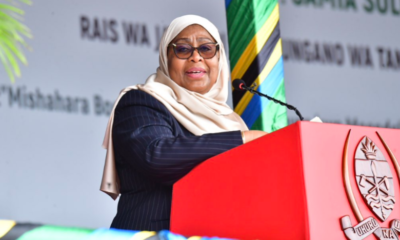

‘Slow burner’ Tanzania is at it again, but she needs to learn to make more noise, By Charles Onyango-Obbo
-
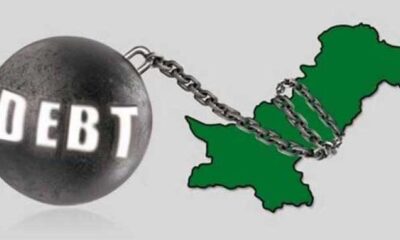

Forecast is not destiny; Africa is on the path to prosperity, By Mohamed Ghazouani
-
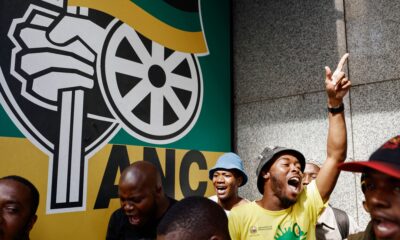

Don’t cry for Mandela’s party; ANC’s poll loss is self-inflicted, By Jenerali Ulimwengu
-


Appraising 25 years of return to democracy, By Jide Ojo
-
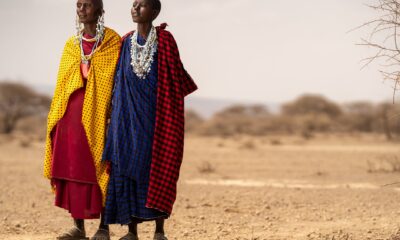

Time to end ethnic jingoism; we thrive or die together, Tee Ngugi
-
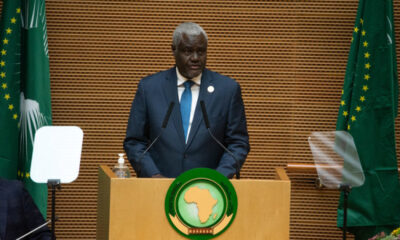

If I were put in charge of a $15m African kitty, I’d first deworm children, By Charles Onyango-Obbo
Strictly Personal
All eyes in Africa are on Kenya’s bid for a reset, By Joachim Buwembo
Published
6 days agoon
July 21, 2024
Whoever impregnated Angela Rayner and caused her to drop out of school at the tender age of 16 with no qualifications might be disappointed that we aren’t asking who her baba mtoto (child’s father) is; whether he became a president, king or a vagabond somewhere, since the girl ‘whose leg he broke’ is now UK’s second most powerful person, 28 years since he ‘stole her goat’.
Angela’s rise to such heights after the adversity should be a lesson to countries which, six decades after independence, still have millions of citizens wallowing in poverty and denied basic human dignity, while the elite shamelessly flaunt obscene luxury on their hungry, twisted faces.
After independence, African countries also suffered their adolescent setbacks in the form of military coups. Uganda’s military rule lasted eight years, Kenya’s about eight hours on August 1, 1982, while Tanzania’s didn’t materialise and its first defence chief became an ambassador somewhere.
What we learn from Angela Rayner is that when you’re derailed, it doesn’t matter who derailed you, because nobody wants to know. What matters is that you pick yourself up, not just to march on, but to stand up and shine.To incessantly blame our colonial and slave-trading ‘derailers’ while we treat our fellow citizens worse than the colonialists did only invites the world to laugh. Have you ever read of a colonial officer demanding a bribe from a local before providing the service due?
African countries today need to press ‘reset’. A state operates by written policies, plans, strategies and prescribed penalties with gazetted prisons for those who break the rules. This is far more power than teenage Angela had, so a reset state should take less time to become prosperous than the 28 years it took her to get to the top after derailing.
So it’s realistic for countries to operate on five-year planning and electoral cycles, so a state that fails to implement a programme in five years has something wrong with it. It needs a reset.
A basic reset course for African leaders and economists should include:
1. Mindset change: Albert Einstein teaches us that no problem can be solved from the same level of consciousness that created it. For example, if you are in debt, seeking or accepting more debt is using the same level of thinking that put you there. If you don’t like Einstein’s genius, you can even try an animal in the bush that falls into a hole and stops digging. Our economists are certainly better than a beast in the bush.
2. Stealing is wrong: African leaders and civil servants need to revisit their catechism or madarasa – stealing public resources is as immoral as rape.
3. Justifying wrong doesn’t make it right: Using legalese and putting sinful benefits in the budget is immoral and can incite the deprived to destroy everything.
4. Take inventory of your resources and plan to use them: If Kenya, for example, has a railway line running from Mombasa to Nairobi, is it prudent to borrow $3.6 billion to build a highway parallel to it before paying off and electrifying the railway?
If Uganda is groaning under a $2 billion annual petrol import bill, does it make sense to beg Kenya for access to import more fuel, when Kampala is already manufacturing and marketing electric buses, while failing to use hundreds of megawatts it generates, yet the country has to pay for the unused power?
If Tanzania… okay, TZ has entered the 21st Century with its electric trains soon to be operating between Dar es Salaam and Morogoro. Ethiopia, too, has connected Addis Ababa to the port of Djibouti with a 753-kilometre electric railway, and moves hundreds of thousands of passengers in Addis every day by electric train.
5. Protect the environment: We don’t own it, we borrowed it from our parents to preserve it for our children. Who doesn’t know that the future of the planet is at stake?
6. Do monitoring and evaluation: Otherwise you may keep doing the same thing that does not work and hope for better results, as a sage defined lunacy.
7. Don’t blame the victims of your incompetence: This is basic fairness.
We could go on, but how boring! Who doesn’t know these mundane points? We are not holding our breath for Angela’s performance, because if she fails, she will be easily replaced. Africa’s eyes should now be on Kenya to see how they manage an abrupt change without the mass bloodshed that often accompanies revolutions.
Strictly Personal
The post-budget crisis in Kenya might be good for Africa, after all, By Joachim Buwembo
Published
2 weeks agoon
July 10, 2024
The surging crisis that is being witnessed in Kenya could end up being a good thing for Africa if the regional leaders could step back and examine the situation clinically with cool-headed interest. Maybe there is a hand of God in the whole affair. For, how do explain the flare not having started in harder-pressed countries such as Zambia, Mozambique and Ghana?
As fate would have it, it happened in East Africa, the region that is supposed to provide the next leadership of the African Union Commission, in a process that is about to start. And, what is the most serious crisis looming on Africa’s horizon? It is Debt of course.
Even the UN has warned the entire world that Africa’s debt situation is now a crisis. As at now, three or four countries are not facing debt trouble — and that is only for now.
There is one country, though, that is virtually debt-free, having just been freed from debt due to circumstances: Somalia. And it is the newest member of the East African Community. Somalia has recently had virtually all its foreign debt written off in recognition of the challenges it has been facing in nearly four decades.
Why is this important? Because debt is the choicest weapon of neocolonialists. There is no sweeter way to steal wealth than to have its owners deliver it to you, begging you, on all fours, to take it away from them, as you quietly thank the devil, who has impaired their judgement to think that you are their saviour.
So?
So, the economic integration Africa has embarked on will, over the next five or so years, go through are a make-or-break stage, and it must be led by a member that is debt-free. For, there is no surer weapon to subjugate and control a society than through debt.
A government or a country’s political leadership can talk tough and big until their creditor whispers something then the lion suddenly becomes a sheep. Positions agreed on earlier with comrades are sheepishly abandoned. Scheduled official trips get inexplicably cancelled.
Debt is that bad. In African capitals, presidents have received calls from Washington, Paris or London to cancel trips and they did, so because of debt vulnerability.
In our villages, men have lost wives to guys they hate most because of debt. At the state level, governments have lost command over their own institutions because of debt. The management of Africa’s economic transition, as may be agreed upon jointly by the continental leaders, needs to be implemented by a member without crippling foreign debt so they do not get instructions from elsewhere.
The other related threat to African states is armed conflict, often internal and not interstate. Somalia has been going through this for decades and it is to the credit of African intervention that statehood was restored to the country.
This is the biggest prize Africa has won since it defeated colonialism in (mostly) the 1960s decade. The product is the new Somalia and, to restore all other countries’ hope, the newly restored state should play a lead role in spreading stability and confidence across Africa.
One day, South Sudan, too, should qualify to play a lead role on the continent.
What has been happening in Kenya can happen in any other African country. And it can be worse. We have seen once promising countries with strong economies and armies, such as Libya, being ravaged into near-Stone Age in a very short time. Angry, youthful energy can be destructive, and opportunistic neocolonialists can make it inadvertently facilitate their intentions.
Containing prolonged or repetitive civil uprisings can be economically draining, both directly in deploying security forces and also by paralysing economic activity.
African countries also need to become one another’s economic insurance. By jointly managing trade routes with their transport infrastructure, energy sources and electricity distribution grids, and generally pursuing coordinated industrialisation strategies in observance of regional and national comparative advantages, they will sooner than later reduce insecurity, even as the borders remain porous.
EDITOR’S PICK


Trevor Noah set for ‘Off the Record’ world tour
South African comedian and talk show host, Trevor Noah, has announced a date for his “Off The Record” global tour...


SA mobility startup LULA acquires UK-based Zeelo’s operations
South Africa’s mobility startup, LULA, has announced the acquisition of the operations of UK-based Zeelo in a move that will...


Ngannou accuses Joshua of employing dirty tactics in their fight in Saudi Arabia
Former UFC heavyweight champion, Francis Ngannou, has accused British-Nigerian boxer, Anthony Joshua, and his promotion team of employing unfair and...


#EndBadGovernance Protests: Please be patient with Tinubu’s govt, monarchs beg Nigerian youths
Some prominent traditional rulers in Nigeria have pleaded with Nigerian youths and organizers of the planned nationwide #EndBadGovernance protests scheduled...


UNESCO removes Senegal’s Niokolo-Koba National Park from list of World Heritage sites in danger
The United Nations’ Educational, Scientific and Cultural Organization (UNESCO) has removed Senegal’s Niokolo-Koba National Park from the list of World...


At Project Aliyense discourse, panelists call for balance between free speech, ethical considerations
The government has been urged to balance freedom of speech with ethical considerations and laws that prevent harm to others....


Adenia Partners acquires Air Liquide’s operations in 12 African countries
Adenia Partners, a leading private equity firm, has completed the acquisition of Air Liquide’s operations in 12 African countries, adopting...


We will handle planned nationwide protests as family matter— Nigerian Govt
The Nigerian government says it will handle the planned #EndBadGovernance protests scheduled to commence on August 1 as a family...


Veteran Nigerian entertainer Charly Boy vows to divorce wife if Kamala Harris doesn’t win US presidential election
Veteran Nigerian entertainer, Charles Oputa, popularly known as Charly Boy, has vowed to divorce his wife of 47 years if...


Saudi club Al Hilal places African transfer record bid for Osimhen
Saudi Arabia club side, Al-Hilal, have reportedly made an African transfer record bid for Super Eagles and Napoli striker, Victor...
Trending
-

 Sports2 days ago
Sports2 days agoMeet Nigerian-born players doing big things for Japan at Paris 2024 Olympics
-

 Metro2 days ago
Metro2 days agoWe will handle planned nationwide protests as family matter— Nigerian Govt
-

 Tech2 days ago
Tech2 days agoAdenia Partners acquires Air Liquide’s operations in 12 African countries
-

 Metro21 hours ago
Metro21 hours ago#EndBadGovernance Protests: Please be patient with Tinubu’s govt, monarchs beg Nigerian youths


